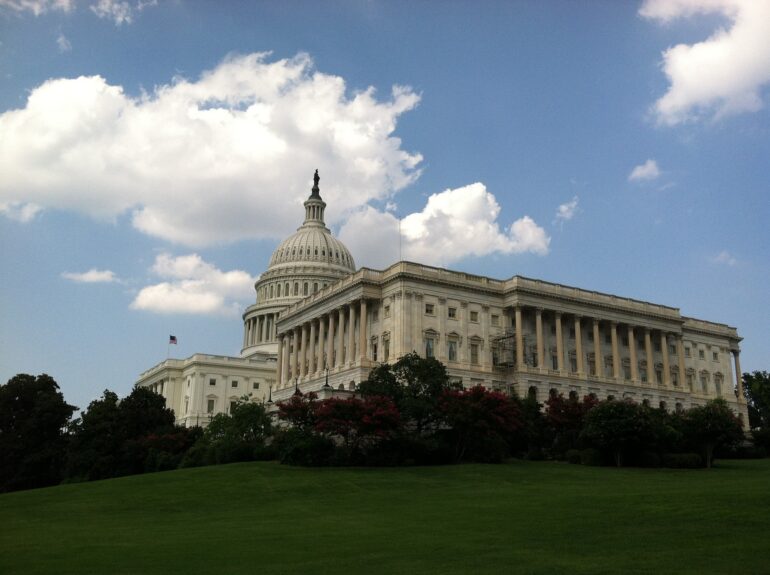TL;DR:
- Congress is considering the inclusion of artificial intelligence (AI) systems in patent law, raising questions about their role as inventors.
- U.S. law currently restricts patents to human inventors, but AI’s ability to create innovative molecules and designs challenges this framework.
- Concerns arise about innovation moving offshore if AI-generated inventions are not recognized in patent law.
- Experts have differing views on whether AI systems should be considered inventors or tools assisting human inventors.
- Some argue that AI lacks the capability for recognition and appreciation of inventions, while others advocate for patenting AI-generated inventions to encourage innovation and disclosure.
- Google believes that humans should be recognized as inventors, with AI serving as a valuable tool in the invention process.
- Congress plans to hold hearings to address these novel questions and ensure that AI-driven innovation remains within the United States.
Main AI News:
As artificial intelligence (AI) continues to revolutionize various industries, Congress finds itself at a crossroads, contemplating whether AI should possess the power to obtain patents. This issue holds significant implications for inventive processes like drug discovery, raising questions about the patentability of AI-generated innovations. Currently, U.S. law restricts patent issuance to human inventors, but the emergence of AI’s ability to create new molecules and design groundbreaking products is challenging this traditional framework.
At a recent hearing, Senator Chris Coons, Chairman of the Senate Judiciary Subcommittee on Intellectual Property, emphasized the need to address the unique challenges posed by AI. Acknowledging the potential for AI to drive innovation, Coons expressed concerns about intellectual property fleeing to countries with more favorable laws. To prevent such an outcome, the panel plans to conduct a series of hearings, aiming to ensure that AI-generated inventions remain within the United States.
During the June 7 hearing, Senator Coons referenced a remarkable achievement by scientists at the Massachusetts Institute of Technology (MIT). They employed an AI system to identify a novel antibiotic—the first of its kind since the 1980s, when scientists abandoned the pursuit due to the time and cost involved in traditional methods. This AI-powered drug targets Acinetobacter baumannii, a bacteria responsible for pneumonia and meningitis among hospitalized patients, which had developed resistance to existing antibiotics. MIT researchers trained a machine-learning model using a vast library of approximately 7,000 drug compounds, enabling it to assess a chemical compound’s ability to inhibit bacterial growth.
However, under current laws, the status of AI systems and human scientists as inventors remains ambiguous. This unresolved question was exemplified in the case of computer scientist Stephen Thaler, whose AI system autonomously designed a beverage holder and an emergency light beacon. Thaler sought a U.S. patent for these inventions but faced rejection from the U.S. Patent and Trademark Office. Lower courts upheld this decision, leading Thaler to appeal to the Supreme Court. While the high court declined to take up the case, South Africa took a different stance and granted a patent listing the AI system as the inventor. Such divergent approaches highlight lawmakers’ concerns about innovation moving offshore.
At the Senate Judiciary hearing, experts expressed differing views on whether AI systems should be considered inventors or merely tools assisting human inventors. Corey Salsberg, Head of IP Affairs at Novartis, argued that recognition and appreciation of an invention, a crucial aspect of the law, currently reside exclusively within human capability. Salsberg emphasized that AI systems lack the consciousness necessary to understand and appreciate their own inventions fully. Despite employing generative AI tools like JAEGER to generate virtual molecules for malaria treatment, Novartis believes that AI’s contribution falls short of qualifying as inventorship.
Ryan Abbott, a professor at the University of Surrey and a representative of Stephen Thaler, advocated for amending U.S. law to allow AI-generated inventions to be patentable. Abbott argued that granting patents in such cases would foster further development of inventive AI, yielding socially valuable innovations. He suggested that patent protection would encourage disclosure of AI-generated inventions, spur investments for commercialization, and prevent valuable inventions from being hoarded as trade secrets. Abbott drew a distinction between human computer scientists involved in AI development and the role they play, likening them to teachers and mentors. In his view, unless these individuals directly contribute to conceiving a specific invention, they should not be considered inventors under U.S. law.
Laura Sheridan, Head of Patent Policy at Google, presented an alternate perspective. Google maintains that only humans should be named as inventors, with AI serving as a valuable tool in the invention process. Sheridan argued that current industry applications of AI fall within a realm where human inventors should be recognized. While acknowledging the collaborative potential between humans and AI, Google believes that the primary inventive responsibility should reside with humans, at least for the foreseeable future.
As Congress deliberates on the profound implications of AI in patent law, finding the right balance between AI-generated inventions and human inventors remains a paramount challenge. The hearings planned by the Senate Judiciary Subcommittee on Intellectual Property will play a pivotal role in shaping the United States’ approach to incentivizing and protecting AI-driven innovation. While differing opinions persist, the outcome of these discussions will set a critical precedent for the future of patent law in an increasingly AI-driven world.
Conclusion:
The consideration of AI’s role in patent law carries significant implications for the market. Clarifying the status of AI-generated inventions and their inventors will shape the future of innovation and intellectual property. Balancing the recognition of AI’s contributions with the expertise and creative input of human inventors is crucial to fostering a thriving market environment that incentivizes disclosure and investment in AI-driven inventions.

